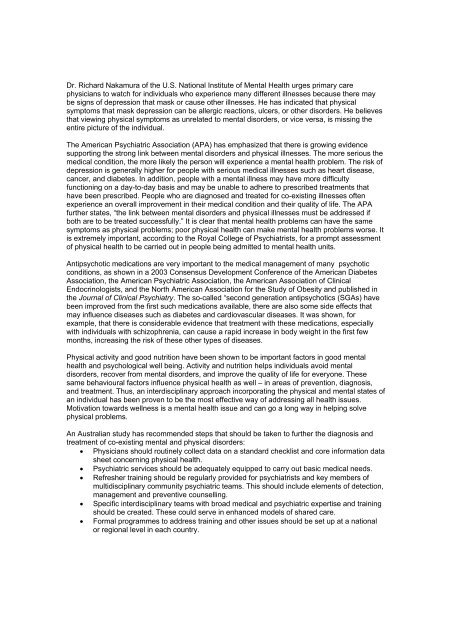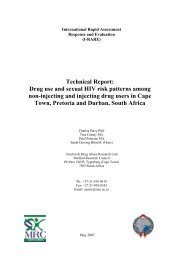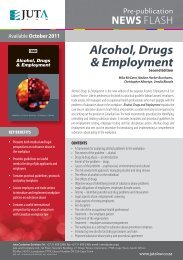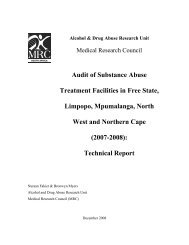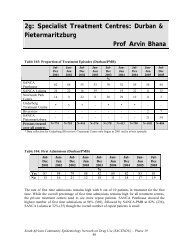INTRODUCTION TO WORLD MENTAL HEALTH DAY 10 OCTOBER ...
INTRODUCTION TO WORLD MENTAL HEALTH DAY 10 OCTOBER ...
INTRODUCTION TO WORLD MENTAL HEALTH DAY 10 OCTOBER ...
You also want an ePaper? Increase the reach of your titles
YUMPU automatically turns print PDFs into web optimized ePapers that Google loves.
Dr. Richard Nakamura of the U.S. National Institute of Mental Health urges primary care<br />
physicians to watch for individuals who experience many different illnesses because there may<br />
be signs of depression that mask or cause other illnesses. He has indicated that physical<br />
symptoms that mask depression can be allergic reactions, ulcers, or other disorders. He believes<br />
that viewing physical symptoms as unrelated to mental disorders, or vice versa, is missing the<br />
entire picture of the individual.<br />
The American Psychiatric Association (APA) has emphasized that there is growing evidence<br />
supporting the strong link between mental disorders and physical illnesses. The more serious the<br />
medical condition, the more likely the person will experience a mental health problem. The risk of<br />
depression is generally higher for people with serious medical illnesses such as heart disease,<br />
cancer, and diabetes. In addition, people with a mental illness may have more difficulty<br />
functioning on a day-to-day basis and may be unable to adhere to prescribed treatments that<br />
have been prescribed. People who are diagnosed and treated for co-existing illnesses often<br />
experience an overall improvement in their medical condition and their quality of life. The APA<br />
further states, “the link between mental disorders and physical illnesses must be addressed if<br />
both are to be treated successfully.” It is clear that mental health problems can have the same<br />
symptoms as physical problems; poor physical health can make mental health problems worse. It<br />
is extremely important, according to the Royal College of Psychiatrists, for a prompt assessment<br />
of physical health to be carried out in people being admitted to mental health units.<br />
Antipsychotic medications are very important to the medical management of many psychotic<br />
conditions, as shown in a 2003 Consensus Development Conference of the American Diabetes<br />
Association, the American Psychiatric Association, the American Association of Clinical<br />
Endocrinologists, and the North American Association for the Study of Obesity and published in<br />
the Journal of Clinical Psychiatry. The so-called “second generation antipsychotics (SGAs) have<br />
been improved from the first such medications available, there are also some side effects that<br />
may influence diseases such as diabetes and cardiovascular diseases. It was shown, for<br />
example, that there is considerable evidence that treatment with these medications, especially<br />
with individuals with schizophrenia, can cause a rapid increase in body weight in the first few<br />
months, increasing the risk of these other types of diseases.<br />
Physical activity and good nutrition have been shown to be important factors in good mental<br />
health and psychological well being. Activity and nutrition helps individuals avoid mental<br />
disorders, recover from mental disorders, and improve the quality of life for everyone. These<br />
same behavioural factors influence physical health as well – in areas of prevention, diagnosis,<br />
and treatment. Thus, an interdisciplinary approach incorporating the physical and mental states of<br />
an individual has been proven to be the most effective way of addressing all health issues.<br />
Motivation towards wellness is a mental health issue and can go a long way in helping solve<br />
physical problems.<br />
An Australian study has recommended steps that should be taken to further the diagnosis and<br />
treatment of co-existing mental and physical disorders:<br />
Physicians should routinely collect data on a standard checklist and core information data<br />
sheet concerning physical health.<br />
Psychiatric services should be adequately equipped to carry out basic medical needs.<br />
Refresher training should be regularly provided for psychiatrists and key members of<br />
multidisciplinary community psychiatric teams. This should include elements of detection,<br />
management and preventive counselling.<br />
Specific interdisciplinary teams with broad medical and psychiatric expertise and training<br />
should be created. These could serve in enhanced models of shared care.<br />
Formal programmes to address training and other issues should be set up at a national<br />
or regional level in each country.


